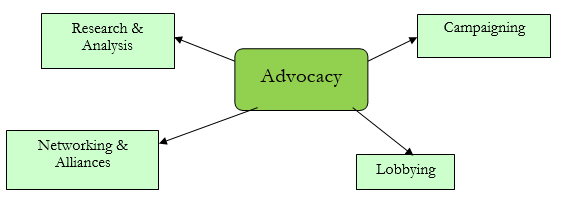
What is Advocacy?
Why Do Advocacy Work?
What Type of Advocacy?
Course Glossary
What is Advocacy?
Definitions
Advocacy originally referred to the process whereby a legal representative spoke on behalf of a client in court. The Concise Oxford Dictionary defines advocacy as: ‘verbal support or argument for a cause, policy etc.’ However, its meaning has evolved and broadened over time, and in a civil society context it is now generally understood to represent the deliberate process of influencing those who make policy.
Advocacy can concern:
- The creation of policies
- The reform of policies
- The effective implementation and enforcement of policies
'Policy' refers to any ‘course or principle of action adopted or proposed by a government, party, business or individual etc.’, so this includes government legislation but can be much wider than this.
The term 'lobbying' is sometimes used interchangeably with ‘advocacy’, but there is a distinction. The Concise Oxford Dictionary defines lobbying as: ‘A body of persons seeking to influence legislators on behalf of a particular interest’. Thus, whilst advocacy has the wider meaning described above, lobbying refers specifically to efforts to influence legislation. Lobbying is usually carried out by a small number of people, who are experts in their subject.
The term ‘campaigning’ can also cause confusion. The Concise Oxford Dictionary defines campaigning as: ‘An organized course of action for a particular purpose, especially to arouse public interest’. In essence, campaigning is a motivational exercise, designed to activate members of the public to do something that leads to change.
Both lobbying and campaigning are activities that (along with others) can be part of advocacy work. This is shown diagrammatically:

Advocacy is a strategy or process to bring about beneficial change in the policies and practice of influential institutions, groups and/or individuals.
Demystifying Advocacy
When beginning advocacy work there is often a feeling of mystique about what is involved, and this can lead to unease and even fear. Once you launch into the process, this will soon fade as you follow these guidelines and effective research leads naturally to a good strategy, with an easy step-by-step approach, and contacts become ‘real people’ instead of daunting politicians, bureaucrats, opponents etc.
In fact, we all carry out advocacy at some stage in our lives. Children from all creeds and cultures learn how to influence their parents’ decisions in their favor (no matter how subtly!). Any meaningful human relationship involves power balances, influence and communication.
In our work, we often come across situations where we need to influence others. Here, we may instinctively employ advocacy tactics such as: research, planning, alliance-building, communication and negotiation. We simply learn by experience – trying out an approach, and then refining our tactics according to what proves to be effective. The good news is that the same applies to our advocacy campaigns: with experience (and learned process) they will soon become second nature.
There no ‘one size fits all’ formulas to advocacy work across the world. Each country has its complex divergence of cultures, politics, religions and societies. In some countries, certain advocacy activities may not be possible or acceptable, so will need to be replaced by more appropriate methods of influence. In every case, country-specific experience and common sense should be applied. Culturally appropriate advocacy will feel more natural, and effective.
Dealings with government can be especially intimidating for some. Here, it is worth remembering that if you are in a democracy you are entitled to play a part in the governance of your country. Indeed, Article 21 of the Universal Declaration of Human Rights states:
"Everyone has the right to take part in the government of his country, directly or through freely chosen representatives."


